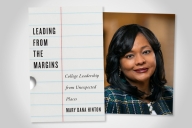You have /5 articles left.
Sign up for a free account or log in.
It's hard to attend scholarly meetings these days without someone talking about the "crisis of scholarly publishing," which goes something like this: Libraries can't afford to buy new scholarly books; in turn, university presses can't afford to publish books no one can buy and so cut back on their sales of monographs; in turn, junior professors can't get their first books published and have a tough time getting tenure.
Rice University on Thursday announced a plan to shake up those interconnected problems. Rice University Press, which was killed in 1996, will be revived. But unlike every other university press, it will publish all of its books online only. People will be able to read the books for no charge and to download them for a modest fee. Editors will solicit manuscripts and peer review panels will vet submissions -- all in ways that are similar to the systems in traditional publishing.
Without the pressure to publish only works that can sell enough copies to justify a print run, Rice hopes to be able to publish scholarship that university presses increasingly feel they can't afford. And by using peer review as other presses do, the university hopes to make its books "count" in tenure reviews just as any other press's would. And Rice also announced plans Thursday to take on the textbook industry, offering print-on-demand textbook versions of scholarly resources it has been assembling -- generally for less than $25.
"There has just been a failure of leadership on how to migrate away from the traditional models," said Charles Henry, vice provost and university librarian at Rice, who is also the new publisher of Rice University Press. "What we want to do is to take the various aspects of educational publishing and make them more affordable and streamlined."
The home for Rice's new publishing ventures will be Connexions, the university's open source site that has been gaining more and more users with its compilation of course and scholarly materials, prepared by professors from all over the world and provided for anyone to use. The online database -- with material in several languages -- currently contains more than 3,000 "modules" of information, some of which are freestanding and others that are part of the 166 courses now available. Some colleges have already been using material on Connexions for custom textbooks, but Thursday's announcement seeks to make the program a major publishing force over time.
Richard G. Baraniuk, the founder of Connexions and a professor of electrical and computer engineering at Rice, said that from the time the project was created in 1999, scholarly publishing was a possible area for expansion. "It was clear to us from the beginning that the 'open access' concept was extensible to many other forms of publishing," Baraniuk said, in an e-mail interview from the Paris airport, en route to Vietnam, where government officials want to use Connexions to provide content to the country's universities.
There are common problems with publishing of scholarly books, textbooks and journals, he said. "These materials are expensive, static, out of date, in a single language, and access to them is limited to just a few," Baraniuk said, adding that Rice University Press "attacks all of these issues simultaneously."
The press is currently in the process of creating an editorial board, hiring an editor, and planning procedures, with the hopes of starting publication next year. Henry stressed that the people recruited as staff members and to serve on peer review panels would be of the same scholarly standing as can be found at top university presses. People who submit works can expect thorough reviews and to be asked for changes and corrections, if their work is accepted. "For this press to succeed, it has to be perceived as a place for high quality material," he said.
"The common argument that comes back from more traditional presses is that this will be seen as a catch-basin for everything that can't be published," Henry said. "That is a bias, a convenient fiction. This press can have authority and prestige equal with the finest traditional presses."
At the same time, digital publishing can make things easier. All peer review and editing will be online. And Rice plans to have the time between final acceptance of revisions and actual publication -- which can be many months in standard publishing -- cut to about one week.
While the press will feature works in a range of disciplines, Henry said he's particularly excited about the contribution the press may be able to make in fields in which the current economics of publishing are severely limiting. Art history, for example, is very difficult to publish because serious numbers of illustrations add hugely to publishing. But high resolution images can be used by the Rice press. Musicology books might feature audio or video.
Financially, details are still being finalized. But Henry said he anticipated that authors would receive royalties whenever their works are downloaded. Slightly larger fees will be charged to readers who want a print copy, which they would purchase in a print-on-demand system. There too, royalties would be shared. Henry said that the press would not require "subventions" -- payments from authors or their universities to cover publishing costs. Henry said that when you consider how small the payments are to professors for their work, and the growing use of subventions, authors could stand to gain.
A Textbook Approach
For textbooks, Connexions is also introducing a print-on-demand model, and anticipates having more than 100 texts available by the end of this year, based on material already freely available on its Web site. Prices will vary based on the amount of material to be printed, but most would cost less than $25, far less than comparable books.
Baraniuk said that he thought one benefit of Connexions moving in the direction of both textbook and scholarly publishing was that an artificial divide between those two fields might disappear. "I think we're going to see a blurring between the various forms of publication (from textbooks to research monographs and journals), as the Connexions technology 'flattens' the scholarly landscape," he said. He also said that he hoped that high school teachers -- especially in science -- would use some of the material being made available. A high school teacher might pick some college-level material to share with a class, and deal with the widely noted problem of ambitions being too low in many text selections in high schools, he said.
While most experts on scholarly publishing are only beginning to learn about Rice's plans, initial reaction was favorable. Penelope Kaiserlian, director of the University of Virginia Press and president of the Association of American University Presses, said "we're all trying to find our way in the digital world, and if there are universities willing to support a press that is only digital, that is very exciting."
Virginia has a digital publishing program, Rotunda, and Kaiserlian said that it was important for presses that primarily publish printed books to keep experimenting online.
She added that she was particularly pleased to hear that Rice's press would be revived. While a number of presses have been eliminated by universities over the years, Rice is a major research university, so its decision to end its press 10 years ago "was a very disturbing signal," and the restoration of the press "is something I'm delighted to hear about."
The Rice press plans also arrive at a time that some scholarly associations are pushing for more recognition for digital scholarship. The Modern Language Association has a special committee working on a proposal to change the tenure process in many ways, one of which is to provide more recognition for work online. English professors have been particularly concerned about the decline of monograph publishing, which has made it especially difficult for them to earn tenure.
Sean Latham, associate professor of English and director of the Modernist Journals Project at the University of Tulsa, is a member of the MLA tenure reform committee, and he said Thursday that he was very encouraged by the Rice announcement. "This sounds like a fascinating model," he said.
In many ways, he said, online repositories created by various groups of science journals have put science ahead of the humanities when it comes to digital scholarship. An online university press may be what is needed to bring humanities up to speed, he said. "What's really interesting is breaking out of the model of print publishing," he said.
Latham said that from a practical standpoint, humanities scholars would lose little from not having print editions. "It's not like any of us get rich off of royalties now," he said.
The challenge, he said, will be to get campus tenure committees to treat Rice University Press books with the same respect as other university press books. "Having a prestigious university's name attached" should help, he said, "because we do all worry about the fetish of the book."







.jpg?itok=ShaCesee)
